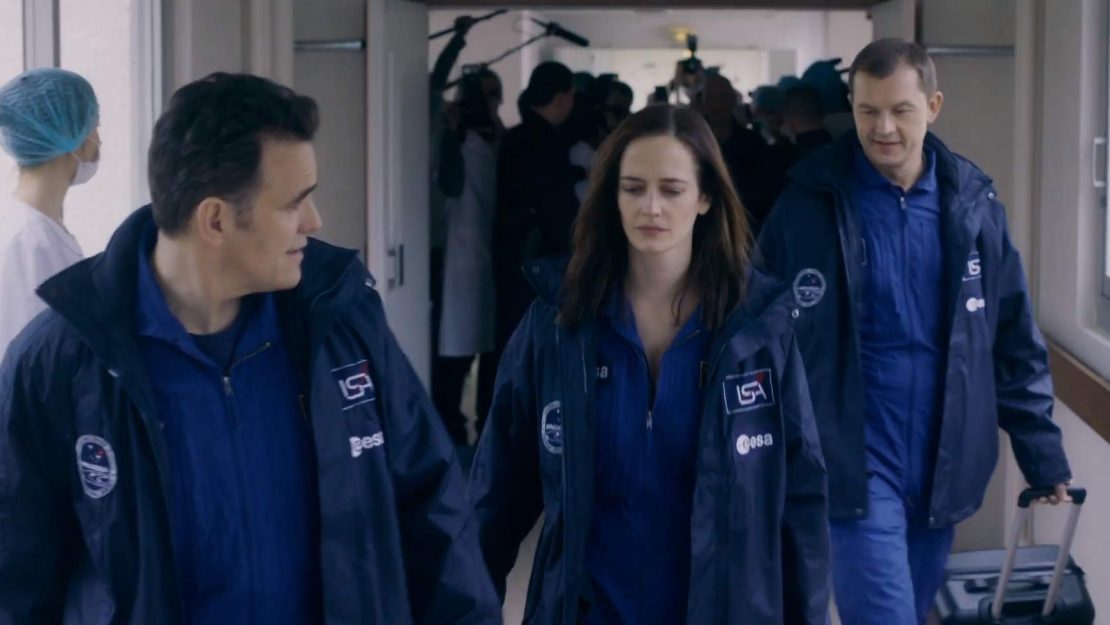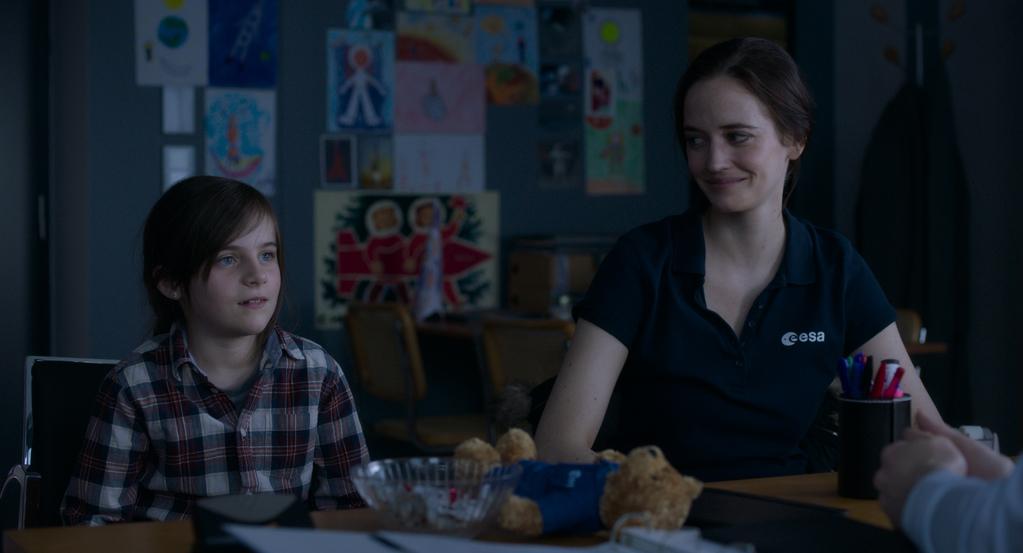
“Proxima” Movie Review by Josh Davis
November 15, 2020 5:06 pm |

There’s a certain romance about the idea of going into space. So many as children dream of the adventure and wonder of flying into the sky, shooting through the earth’s atmosphere, and visiting strange, new worlds.
The reality, however, is that the life of an astronaut is often a lonely existence filled with sacrifice and an incredible strain on one’s physical and mental wellbeing.
“Proxima,” from writer/director Alice Winocour (“Disorder”), follows a woman preparing to leave her 7-seven-old daughter behind for a year-long journey to Mars.
Eva Green (“Penny Dreadful,” “Casino Royale”) plays Sarah Loreau, a French astronaut selected as the only woman on an international mission that also includes Russian and American crew members.
Along with the intense preparation for space travel, Sarah must also part for a year from her young daughter Stella (newcomer Zélie Boulant), with whom she shares a close bond. Stella will stay with her father, Thomas Akerman (Lars Eidinger, “Babylon Berlin”), and has to adjust to moving to another country.
The movie also costars Matt Dillon (“Wayward Pines,” “Drugstore Cowboy”) as Mike Shannon, a sort of chauvinist mission leader who is skeptical of Sarah’s abilities as an astronaut.
After her father picks Stella up, we watch as Sarah goes through the grueling preparation for space travel. She’s strapped inside a centrifuge for high-g training in one moment, and then working underwater in a heavy, bulky spacesuit the next. The stress of it all is exhausting to watch and clearly takes its toll on Sarah.

Stella is also put through the ringer. She struggles with a more rigorous school program, as well as a new and unfamiliar home.
The biggest hardship for both, however, is being apart. Stella starts to resent her mother, while Sarah has trouble staying focused.
Winocour expertly shows the hardship of the family separation. Her direction is minimal and restrained, giving the actors room show through facial expressions and movements and pauses, all the grief they’re facing.
The movie is also rich with symbolism. “Proxima,” for instance, roughly translates in Latin to “closest” or “nearest.”
Sarah and Stella’s struggle of being apart start to manifest in physical ways. Sarah has a wound that won’t heal. She carries it with her and it threatens her ability to be a part of the mission. Stella, meanwhile, fractures her arm — a metaphor for her relationship with her mother.
Winocour’s writing is often lyrical — even poetic. Some of Sarah’s inner thoughts that we see and hear on screen (the film is alternately in French, English and Russian) feel like poetry.
In a spoken letter to her daughter, Sarah writes:
“Last days on Earth before leaving the planet.
Anton said he had some recording to do.
Sounds of the forest and rain.
It’s what he missed most up there.
He even stuck pictures of forests in the Station.
Spring, summer, autumn, winter.
You know, up there, none of that exists.
Nor the feeling of wind on your skin.
Nor rays of sunshine on your hair.
We spin so fast around the Earth that I’ll see 16 sunsets every day.
I’ll think of your question when you were little … When the sun goes to bed, is anyone there to tell it a story?”
Green is outstanding in the lead and easily carries the film. The audience is sharply aware of what she’s going through, from her delivery, to the expressions that convey everything that words cannot.
Boulant, in her first feature role, flashes some fantastic range. She’s alternately frustrated and angry at her mother, but also playful and adoring in the few moments spent together before they’ll be separated by millions of miles.
Eidinger also makes the most in a limited role, as a father trying to comfort and connect with his daughter.
Two scenes near the end ramp up the emotional depth of the film and really showcase the dynamic of the mother-daughter relationship.
After Stella and Thomas miss their flight, Stella has to say goodbye to her mother through a thick pane of glass as Sarah prepares in quarantine for the final stages of mission prep. It’s heartbreaking to watch, and the two lead actors perfectly convey how difficult it is to be separated — again with the strong symbolism.
Later, Sarah has one last encounter with her daughter. The scene, all about fulfilling a promise, is both emotionally joyous and breathtakingly beautiful in the way it’s shot, with the actors both literally and figuratively shining. The framing and the light become so much a part of telling the story.
“Proxima,” ultimately, is a movie about mothers and daughters and the bond they share. But it’s also a stirring and timely portrait of the difficulty of being a female astronaut with a family, in what’s still a very male-dominated profession. In the closing credits, we see photos of several female pilots and astronauts with their children, as if to drive home that point.
The film leaves one feeling how hard this kind of life must be. Many have jobs that take them away from their families, but so few are literally planets away.
For a movie about space travel, “Proxima” is incredibly intimate. Not for a second do you expect big action scenes or loud explosions — this is a character study of a woman doing an important but difficult job.
Green has never been better, and Winocour, who previously co-wrote the Oscar-nominated film “Mustang” with Deniz Gamze Ergüven, again proves herself as a gifted writer. She’s also one to watch as a director.
“Proxima” is scheduled for release on Nov. 6 on digital and video-on-demand platforms.
PCL Rating: Tupperware
Rotten Tomatoes Rating: FRESH 🍅
Tags: Alice Winocour, Eva Green, Matt Dillon, Proxima film, Proxima movie 2019, Proxima movie 2020
Categorised in: Movie Reviews
This post was written by Leftover Brian
Comments are closed here.




